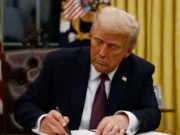The UK scheme to pay wages of workers on leave because of coronavirus will be extended to October, Chancellor Rishi Sunak said.
Mr Sunak confirmed that employees will continue to receive 80% of their monthly wages up to £2,500.
But he said the government will ask companies to “start sharing” the cost of the scheme from August.
Over a quarter of all workers, some 7.5 million people in total, are now covered by the scheme.
The chancellor said that from August, the scheme would continue for all sectors and regions of the country but with greater flexibility to support the transition back to work, he said.
Employers currently using the scheme will then be able to bring furloughed employees back part-time.
Mr Sunak said: “I’m extending the scheme because I won’t give up on the people who rely on it.
“Our message today is simple: we stood behind Britain’s workers and businesses as we came into this crisis, and we will stand behind them as we come through the other side.”
He also rejected suggestions some people might get “addicted” to furlough if it was extended.
“Nobody who is on the furlough scheme wants to be on this scheme,” the chancellor said. “People up and down this country believe in the dignity of their work, going to work, providing for their families, it’s not their fault their business has been asked to close or asked to stay at home.
Shadow chancellor Anneliese Dodds said she had only learned of the changes “in the last few seconds” and would examine them “very, very carefully”.
But she added that it was “critically important” that workers who had to continue on furlough “are not penalised for that choice”.
No ‘silver bullet’
Businesses largely welcomed the extension, with business group the British Chambers of Commerce saying the move would bring “significant relief” to employers and workers,
And Stephen Phipson, chief executive of manufacturing group Make UK, said it would avoid “a looming cliff edge triggering significant redundancies for many companies and recognises the need for greater flexibility as the economy fires up.”
However, he warned that there was no “silver bullet” and that both government and industry would have to be flexible.
There was also support from the TUC, with general secretary Frances O’Grady saying the extension “will be a big relief for millions”.
But she added: “As the economic consequences of Covid-19 become clear, unions will keep pushing for a job guarantee scheme to make sure everyone has a decent job.”
Paul Johnson, director of the Institute of Fiscal Studies economic think tank, estimates the scheme will have cost nearly £100bn by October. It is thought that about 935,000 businesses signed up for the scheme in total.
Reports of the demise of the furlough scheme have been somewhat exaggerated. It was never going to be scrapped, especially after the Bank of England stressed the scheme’s importance for economic recovery.
Over a quarter of all jobs – 27%, 7.5 million in total – are now paid for by the taxpayer, potentially for eight months. After that, the level of subsidy from taxpayer will be lowered, with employers expected to pay a contribution.
By August, the scheme could start to look quite similar to longer standing wage subsidy schemes seen in continental Europe. The cost of the scheme to date is already over £10bn. This extension will be tens of billions more, but difficult to put a precise number on this given the lack of detail on the “employer contribution”.
Expensive yes. But what is also costly is letting unemployment sky rocket, as, without the extension, many businesses would have begun 45-day redundancy consultations this week.
The question now is how many businesses still see this as a bridge to some sort of normality where furloughed staff can be phased back into their old jobs.
Unfortunately, some in industries which will not return to normal have already started to fire staff. This announcement buys most workers more time.









































